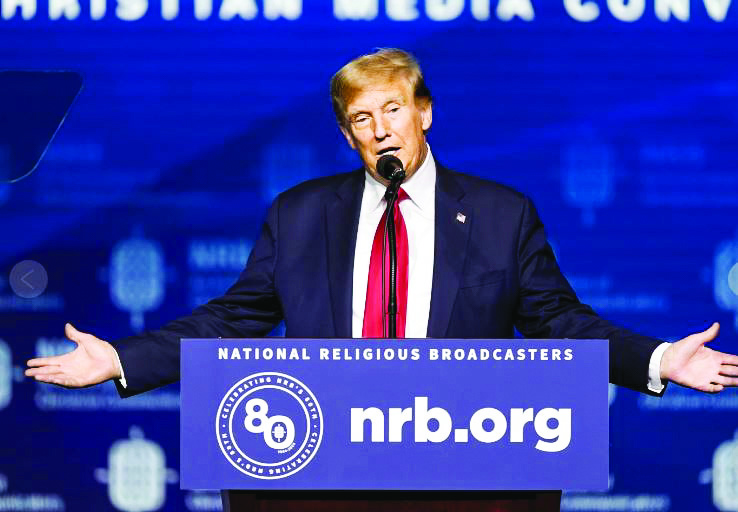Rather than appeasing autocrats and adversaries, US policy should prioritize the protection of Christian communities and other religious minorities.
Panaji, Goa: The 21st century has been a challenging era for Christianity. While Europe has voluntarily turned away from its Christian roots, other communities across the globe face existential threats. From ethnic cleansing to systemic persecution, Christian populations are under siege in many regions. Despite the symbolic nods to faith by US Presidents, few have sincerely upheld the defence of Christian communities abroad. President-elect Donald Trump has the opportunity to change this trajectory by making the protection of persecuted Christians a cornerstone of his second-term foreign policy.
One of the most glaring examples of the failure to defend Christianity occurred in Nagorno-Karabakh. The region’s Christian Armenian population, with a heritage spanning 1,700 years, faced ethnic cleansing at the hands of Azerbaijan. Under the weak leadership of Secretary of State Antony Blinken and US Agency for International Development Administrator Samantha Power, the US failed to act decisively.
Rather than condemning Azerbaijan for its actions, the Biden administration resorted to euphemisms like “depopulation” to describe the forced expulsion of the Christian community. Blinken vetoed stronger language that might have held Azerbaijan accountable, allowing dictator IlhamAliyev to pursue his campaign of ethnic cleansing unchecked. The lack of accountability emboldens aggressors and undermines US credibility on human rights.
For Trump, this is an opportunity to reverse course. He should direct his Secretary of State nominee, Marco Rubio, to explicitly recognize the expulsion of Christians from Nagorno-Karabakh as ethnic cleansing. This acknowledgment is not just symbolic; it sends a message that the US will not tolerate such atrocities and will hold perpetrators accountable.
Nigeria presents another dire example. Under Blinken’s leadership, the State Department removed Nigeria from its religious freedom watchlist, a move that shocked even the US Commission on International Religious Freedom. This decision, rather than promoting tolerance, gave the Nigerian regime tacit permission to escalate violence against its Christian population. Nigeria is now at a tipping point. The Igbo people, predominantly Christian, face persecution reminiscent of the 1967-1970 Biafran genocide. Calls for independence have resurfaced, driven by the need to protect faith and freedom. Yet, the Biden administration’s approach has been dismissive, blaming climate change for the violence rather than addressing the systemic targeting of Christians. For Trump’s administration, safeguarding Nigerian Christians must become a priority. Rubio should work to ensure that Christian communities in Nigeria and across Africa are protected. This not only aligns with America’s moral obligations but also strengthens US credibility in defending human rights globally.
The Russian invasion of Ukraine provides another lens through which to examine the persecution of Christians. President Vladimir Putin’s regime has not only eroded religious freedoms within Russia but has also targeted Ukrainian Christians as part of its broader campaign. Churches have been shuttered, clergy imprisoned, and religious minorities harassed under the guise of territorial conquest.
For Trump, there can be no compromise on religious freedom in Ukraine. Ensuring that Christians and other religious groups can practice their faith freely must be non-negotiable. A principled stance on religious freedom would also serve as a counterbalance to Putin’s aggressive tactics and signal that the US stands firmly with oppressed communities.
Christianity’s birthplace, the Middle East, is another region where the faith is under siege. While the Christian population in countries like Iraq and Syria has dwindled due to war and persecution, one notable exception stands out: Israel. Despite widespread criticism from Europe and the International Criminal Court, Israel remains the only Middle Eastern country where the Christian population is growing.
Contrast this with Bethlehem, a city once synonymous with Christianity, which has seen its Christian population decimated under Palestinian Authority control. This stark disparity underscores the importance of supporting democracies like Israel, where religious minorities can thrive. For Trump and Rubio, this means reforming the State Department’s approach to the Middle East. Rather than appeasing autocrats and adversaries, US policy should prioritize the protection of Christian communities and other religious minorities. Ensuring their survival is not just a matter of moral obligation but also a strategic imperative for promoting stability in the region.
Trump and his advisors may question whether the defence of persecuted Christians aligns with broader American interests. The answer lies in history: regimes that respect religious freedom are often more stable, trustworthy, and sincere in their dealings.
Conversely, governments that target faith groups are often the same ones that pose broader threats to global security. Making religious freedom a central tenet of US foreign policy would not only address the immediate needs of persecuted Christians but also reinforce America’s standing as a defender of human rights and democracy.
The challenges faced by Christians worldwide demand urgent attention. From the ethnic cleansing in Nagorno-Karabakh to the persecution in Nigeria and the Middle East, the plight of Christian communities underscores the moral failures of current US foreign policy.
President-elect Trump has the opportunity to redefine America’s role on the global stage. By prioritizing the defence of Christian communities, he can not only address a pressing humanitarian crisis but also cement his legacy as a champion of religious freedom.
For Rubio, this means adopting a principled approach that holds perpetrators accountable and supports vulnerable communities. Whether in Armenia, Africa, Ukraine, or the Middle East, the defence of Christianity is both a moral imperative and a strategic necessity.
Christianity’s survival in the 21st century depends on the willingness of global leaders to act decisively. For Trump, this is a defining moment. The question is whether he will seize it.
Savio Rodrigues is the founder and editor-in-chief of Goa Chronicle.

